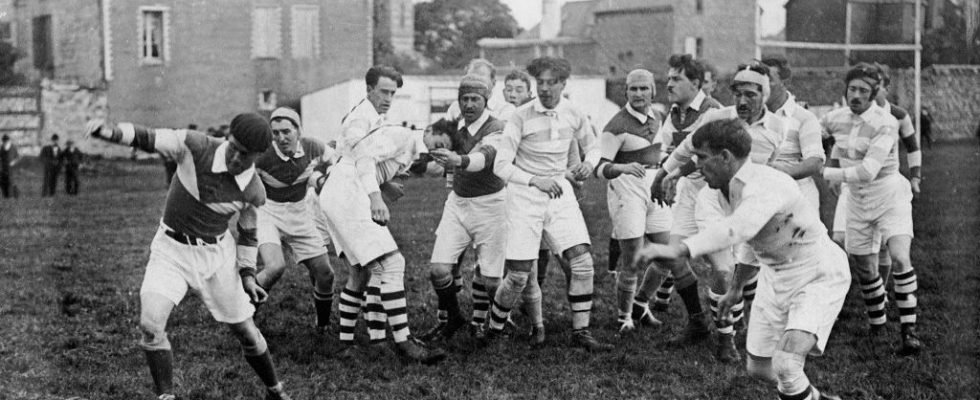On June 26, 2024, Le Havre is preparing to raise the thirtieth shield of Brennus in its history. Annoyed, the Parisians of the Stade Français promise to take their revenge against their eternal rivals. In Bayonne or Toulouse, we prefer to meet to watch the Euro football. THE rugbythis sport for Northerners, never really took root there.
A fiction ? However, rugby, this sport today so closely associated with the South-West, did not arrive in France through these territories. On the occasion of the Rugby World Cup, 20 minutes looks back on this little-known story, which surprisingly goes through regions that have since given their heart and soul to football.
In England, an elite sport
We are in the years 1860-1870. In England, former schoolchildren from public schools, these elite male boarding schools want to continue playing the ball games they love. One of them, in the style of Rugby, one of those schools of the upper bourgeoisie and the aristocracy, stipulates that you can grab the ball in your hand. The distinction between football, an eleven-a-side game with a ban on grabbing the ball in the hand as we know it today, and rugby, is not yet clearly defined.
However, attempts to organize these games began: “The association football was born in 1863,” recalls 20 minutes Xavier Lacarce, author of A brief history of rugby, published in 2021 by Cairn editions. Eight years later, an English rugby federation appeared.
The first French club is in a port
This “codification” of sports is “the great novelty of the 19th century”, underlines the teacher at Sciences-Po Bordeaux. If we consider only the sporting aspect, football and rugby have ancient, French roots, drawing in particular from soule. The second half of the 19th century saw the emergence of clubs and leagues. In France, the first club appeared in a port, which was not that of Toulon: at the beginning of the 1870s, the British played a mix of football-rugby in Le Havre, a Norman trading port, before organizing themselves into a club.
The establishment of rugby in France follows two axes, explains Xavier Lacarce: On the one hand, “British people come to work in France” – this is the example of Le Havre – and on the other “a bourgeoisie at the forefront, open, cosmopolitan” – this is how Racing and Stade Français were born, Parisian clubs of the upper bourgeoisie. “Anglophile French elites are trying to look at the British model – this is typically the example of Pierre de Coubertin [le fondateur des Jeux olympiques modernes]. »
At the time, the practice of sport became valued, whether it was rugby or other sports such as gymnastics. “People like Coubertin will opt for sport, and the most chic, which comes from the best schools. » In Paris, the very select Alsatian school, which still produces ministers, “is one of the places where we are going to adopt rugby”. At the end of the 19th century, Racing and Stade Français dominated France. “The final of the French championship is in reality the annual match between the two clubs,” smiles the historian.
A sport that is developing in more popular classes
In the same 1890s, rugby began to move south. In Bordeaux, the SBUC, which would become the Stade Bordelais, was born from a “mix between chic students” and an old club which mixed English and locals, recalls Xavier Lacarce. “This allowed it to become a stronghold of rugby at the turn of the century. »
The establishment of rugby then developed along the Garonne, to overflow the borders of the South-West on the eve of the First World War. “In 1913, the final was won by Perpignan. We have gone beyond the southwest and the sociology of departure. Rugby appeals to more popular classes and in smaller towns like Agen. »
The priests VS the institutes
How can we explain that rugby has spread to the south, and become a secondary sport in the north-west of France? One of the explanations would lie in the religious or political question. « Jean-Pierre Augustin [un géographe] showed, on the scale of the Landes department, that the left-wing, secular villages opted more for rugby, while in the more Catholic villages, it was more football and basketball,” recalls Xavier Lacarce. “If we extrapolate it to France, we can consider that it was France which was dechristianized the earliest which adopted rugby. »
Despite the efforts of the French rugby federation to remove the southern accent from the oval ball, it is incredibly difficult, a hundred years later, to move this dividing line. Unless some little thumbs from Vannes or Le Havre manage to make their respective region vibrate by lifting the shield of Brennus one day.

